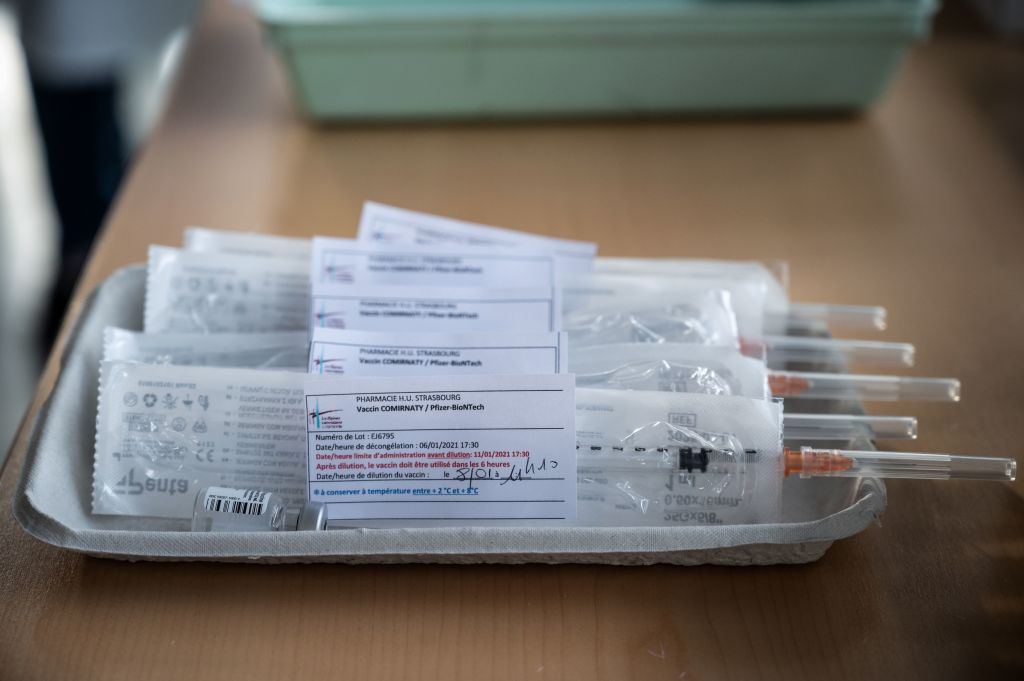Pfizer says tests show its COVID-19 vaccine is effective against new, more contagious variant


A free daily email with the biggest news stories of the day – and the best features from TheWeek.com
You are now subscribed
Your newsletter sign-up was successful
A new, more transmissible variant of the coronavirus, first discovered in England, is spreading around the U.S. — Texas' first confirmed case was reported in Harris County on Thursday. But new research from Pfizer and the University of Texas Medical Branch in Galveston suggests the Pfizer-BioNTech COVID-19 vaccine can protect against the new B117 strain. The researchers reported Thursday night that lab tests on blood samples from 20 vaccinated people showed their antibodies successfully fended off the new strain of the virus.
The new findings are preliminary and haven't yet been reviewed by outside experts, but "it was a very reassuring finding that at least this mutation, which was one of the ones people are most concerned about, does not seem to be a problem" for the vaccine, Pfizer chief scientific officer Dr. Philip Dormitzer told The Associated Press. Pfizer's coronavirus vaccine, like most of the others in use worldwide, trains the body to recognize and fight off the spike proteins that the coronavirus uses to infect cells.
The NF01Y mutation found in the U.K. and a different strain in South Africa was already expected to be susceptible to the new vaccines. Infectious disease experts are more worried about how the vaccines will work on another mutation, E484K, found in the South African variant. Pfizer said its study found the vaccine effective against 15 more possible mutations, but not yet E584K, which is next on the list to study.
The Week
Escape your echo chamber. Get the facts behind the news, plus analysis from multiple perspectives.

Sign up for The Week's Free Newsletters
From our morning news briefing to a weekly Good News Newsletter, get the best of The Week delivered directly to your inbox.
From our morning news briefing to a weekly Good News Newsletter, get the best of The Week delivered directly to your inbox.
Lab studies show that the E584K mutation, also found in Brazil, "could make people's antibodies less effective at neutralizing the virus," Stat News reports. "The mutation seems to help the virus disguise part of its signature appearance, so the pathogen might have an easier time slipping past immune protection." But even if the vaccines are less effective, they won't be useless, molecular virologist Ramón Lorenzo-Redondo at Northwestern University's Feinberg School of Medicine told Stat News. "With one mutation or even three mutations, it's expected the antibodies will still recognize this variant, though they might not recognize it as well as other variants."
A free daily email with the biggest news stories of the day – and the best features from TheWeek.com
Peter has worked as a news and culture writer and editor at The Week since the site's launch in 2008. He covers politics, world affairs, religion and cultural currents. His journalism career began as a copy editor at a financial newswire and has included editorial positions at The New York Times Magazine, Facts on File, and Oregon State University.
-
 Why are election experts taking Trump’s midterm threats seriously?
Why are election experts taking Trump’s midterm threats seriously?IN THE SPOTLIGHT As the president muses about polling place deployments and a centralized electoral system aimed at one-party control, lawmakers are taking this administration at its word
-
 ‘Restaurateurs have become millionaires’
‘Restaurateurs have become millionaires’Instant Opinion Opinion, comment and editorials of the day
-
 Earth is rapidly approaching a ‘hothouse’ trajectory of warming
Earth is rapidly approaching a ‘hothouse’ trajectory of warmingThe explainer It may become impossible to fix
-
 TikTok secures deal to remain in US
TikTok secures deal to remain in USSpeed Read ByteDance will form a US version of the popular video-sharing platform
-
 Unemployment rate ticks up amid fall job losses
Unemployment rate ticks up amid fall job lossesSpeed Read Data released by the Commerce Department indicates ‘one of the weakest American labor markets in years’
-
 US mints final penny after 232-year run
US mints final penny after 232-year runSpeed Read Production of the one-cent coin has ended
-
 Warner Bros. explores sale amid Paramount bids
Warner Bros. explores sale amid Paramount bidsSpeed Read The media giant, home to HBO and DC Studios, has received interest from multiple buying parties
-
 Gold tops $4K per ounce, signaling financial unease
Gold tops $4K per ounce, signaling financial uneaseSpeed Read Investors are worried about President Donald Trump’s trade war
-
 Electronic Arts to go private in record $55B deal
Electronic Arts to go private in record $55B dealspeed read The video game giant is behind ‘The Sims’ and ‘Madden NFL’
-
 New York court tosses Trump's $500M fraud fine
New York court tosses Trump's $500M fraud fineSpeed Read A divided appeals court threw out a hefty penalty against President Trump for fraudulently inflating his wealth
-
 Trump said to seek government stake in Intel
Trump said to seek government stake in IntelSpeed Read The president and Intel CEO Lip-Bu Tan reportedly discussed the proposal at a recent meeting
